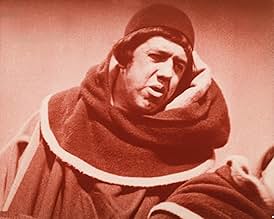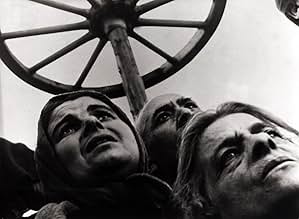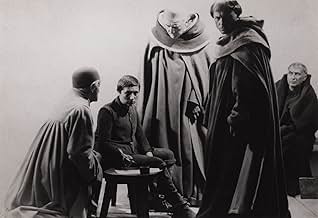Le ultime ore di vita della Pulzella d'Orléans, dall'accusa di eresia al processo dinanzi al tribunale ecclesiastico, dalle torture subite in carcere fino alla condanna al rogo.Le ultime ore di vita della Pulzella d'Orléans, dall'accusa di eresia al processo dinanzi al tribunale ecclesiastico, dalle torture subite in carcere fino alla condanna al rogo.Le ultime ore di vita della Pulzella d'Orléans, dall'accusa di eresia al processo dinanzi al tribunale ecclesiastico, dalle torture subite in carcere fino alla condanna al rogo.
- Regia
- Sceneggiatura
- Star
- Premi
- 4 vittorie e 1 candidatura in totale
Maria Falconetti
- Jeanne d'Arc
- (as Mlle Renée Falconetti)
Eugene Silvain
- Évêque Pierre Cauchon (Bishop Pierre Cauchon)
- (as Eugène Silvain)
Louis Ravet
- Jean Beaupère
- (as Ravet)
Armand Lurville
- Juge (Judge)
- (as André Lurville)
Jean Aymé
- Juge (Judge)
- (non citato nei titoli originali)
Camille Bardou
- Richard Beauchamp, 13th Earl of Warwick
- (non citato nei titoli originali)
Gilbert Dacheux
- Juge (Judge)
- (non citato nei titoli originali)
Gilbert Dalleu
- Jean Lemaître
- (non citato nei titoli originali)
Paul Delauzac
- Martin Ladvenu
- (non citato nei titoli originali)
Dimitri Dimitriev
- Juge (Judge)
- (non citato nei titoli originali)
Riepilogo
Reviewers say 'The Passion of Joan of Arc' is celebrated for its innovative close-ups, emotional intensity, and pioneering silent film techniques. Renée Falconetti's performance is lauded for its subtlety and expressiveness. The film delves into themes of faith, power, and human spirit, contrasting Joan's purity with her accusers' corruption. Critics praise Dreyer's meticulous direction and the film's historical significance. Some find the silent format and close-ups challenging, yet it remains a landmark in cinematic achievement.
Recensioni in evidenza
If you'll pardon the rambling, here are my thoughts immediately after watching this on DVD an hour ago.......
THE STORY - Many of the times, while watching this for the first time, I thought this was almost the re-enactment of Jesus' last day, seeing the phony trial, the trumped-up charges He endured by legalistic, power-hungry religious leaders of the day who had no clue who God is, and then the tragic end to the central character. Apparently, there were a lot of similarities to Joan of Arc's last day and of Christ's day. However, here it's the Catholic leaders who are the 'bad guys' while in Jesus' time it was the Pharisees and the Sanhedrin. Also, with Joan's story here, she is portrayed far differently in her ordeal than Christ did, the latter taking everything in stride stoically while Joan, without any physical beating, still cried constantly and signed some paper in a moment of weakness (although she later recants that, which costs the woman her life.)
Anyway, about this film:
THE GOOD - Wow, what incredible direction and photography. Scene after scene is pretty amazing and especially so when you consider this was made about 80 years ago! I would like to see the same director and photographer doing work with today's technology.
The expressions on Maria Falconetti's face throughout the film are memorable. A sadder, more pained look on Joan of Arc - or anyone else's - I have not seen in a motion picture. She also must have set a record that still stands for the most tears shed by one person in a movie! The woman's eyes were like faucets.
All of the faces in here - and the film is mostly a series of facial closeups - are amazing and kudos to Criterion for making a DVD that showed these faces with a clear picture and amazing detail. Director Carl Theodor Dreyer's camera angles still look innovative today. He and Orson Welles seem to share the same love of this kind of photography. I found myself numerous times just shaking my head in admiration for how these characters were photographed.
Another big plus for this film was the addition of "The Voices of Light." They made the music score in here fantastic. I can't recall too many films in which I have been so impressed with a soundtrack. The DVD gives you the option of watching this film with or without that audio. I strongly recommend viewers to take the audio.
Finally, the story itself is memorable, with a powerful ending.
THE BAD - I have to make these comments to be fair and honest. It's not hard to understand why many people will find this film almost impossible to sit through, especially those with no emotional or spiritual involvement with the story. That is because it is extremely slow and repetitive. Shot-after-shot of just Falconetti agonizing or crying and weird-looking men staring at her. If you aren't a devotee of cinematography, this movie could be extremely boring after about 10 minutes.
As powerful as the story is, it isn't a movie I would recommend for most people. I think most folks - of any age, frankly - would be turned off after 20 minutes. I understand that. As mentioned, this is not an easy film to view. This might be the longest 80-minute movie you'll ever see, if you aren't into it.
OVERALL - Visually and audibly: an astounding movie and one I am glad to have finally watched. If I was wishing to get into the movie business and wanted to learn how to shoot films, this would be a film I would study numerous times. Otherwise, one viewing is plenty. I can only recommend this film to a very select audience.
THE STORY - Many of the times, while watching this for the first time, I thought this was almost the re-enactment of Jesus' last day, seeing the phony trial, the trumped-up charges He endured by legalistic, power-hungry religious leaders of the day who had no clue who God is, and then the tragic end to the central character. Apparently, there were a lot of similarities to Joan of Arc's last day and of Christ's day. However, here it's the Catholic leaders who are the 'bad guys' while in Jesus' time it was the Pharisees and the Sanhedrin. Also, with Joan's story here, she is portrayed far differently in her ordeal than Christ did, the latter taking everything in stride stoically while Joan, without any physical beating, still cried constantly and signed some paper in a moment of weakness (although she later recants that, which costs the woman her life.)
Anyway, about this film:
THE GOOD - Wow, what incredible direction and photography. Scene after scene is pretty amazing and especially so when you consider this was made about 80 years ago! I would like to see the same director and photographer doing work with today's technology.
The expressions on Maria Falconetti's face throughout the film are memorable. A sadder, more pained look on Joan of Arc - or anyone else's - I have not seen in a motion picture. She also must have set a record that still stands for the most tears shed by one person in a movie! The woman's eyes were like faucets.
All of the faces in here - and the film is mostly a series of facial closeups - are amazing and kudos to Criterion for making a DVD that showed these faces with a clear picture and amazing detail. Director Carl Theodor Dreyer's camera angles still look innovative today. He and Orson Welles seem to share the same love of this kind of photography. I found myself numerous times just shaking my head in admiration for how these characters were photographed.
Another big plus for this film was the addition of "The Voices of Light." They made the music score in here fantastic. I can't recall too many films in which I have been so impressed with a soundtrack. The DVD gives you the option of watching this film with or without that audio. I strongly recommend viewers to take the audio.
Finally, the story itself is memorable, with a powerful ending.
THE BAD - I have to make these comments to be fair and honest. It's not hard to understand why many people will find this film almost impossible to sit through, especially those with no emotional or spiritual involvement with the story. That is because it is extremely slow and repetitive. Shot-after-shot of just Falconetti agonizing or crying and weird-looking men staring at her. If you aren't a devotee of cinematography, this movie could be extremely boring after about 10 minutes.
As powerful as the story is, it isn't a movie I would recommend for most people. I think most folks - of any age, frankly - would be turned off after 20 minutes. I understand that. As mentioned, this is not an easy film to view. This might be the longest 80-minute movie you'll ever see, if you aren't into it.
OVERALL - Visually and audibly: an astounding movie and one I am glad to have finally watched. If I was wishing to get into the movie business and wanted to learn how to shoot films, this would be a film I would study numerous times. Otherwise, one viewing is plenty. I can only recommend this film to a very select audience.
10judokid
I saw this a few months ago on the big screen, just after Nosferatu, another silent classic. Both showings were supported by a live organ play, which has been composed directly for the movie, and which suited perfectly. I had seen Nosferatu before, but i didn´t know anything about `Jeanne`, and so i was in no way prepared for this overwhelming, soul-rapturing experience.
My eyes were immediately glued to the screen. Unfortunately i had missed the first minutes, so it started for me with the first (?) court scene. The camera wandered through the faces of the court members, circled and focussed on Jeanne´s face. So beautiful, naked, strong and defenseless! I could rave on the technical perfection of this film, it´s clever editing, innovative and gorgeous cinematography, proper historical settings and pure storytelling. Carl Theodor Dreyer created a masterpiece. But the most outstanding feature of this silent are the performances; Maria Falconetti delivers simply the best performance of all times, and i can´t remember of any ´corny` overacting, which distracts most silent movies from the modern viewer, even the accepted classics. `La passion de Jeanne d´Arc´ is purest cinematic art, timeless in every sense.
My eyes were immediately glued to the screen. Unfortunately i had missed the first minutes, so it started for me with the first (?) court scene. The camera wandered through the faces of the court members, circled and focussed on Jeanne´s face. So beautiful, naked, strong and defenseless! I could rave on the technical perfection of this film, it´s clever editing, innovative and gorgeous cinematography, proper historical settings and pure storytelling. Carl Theodor Dreyer created a masterpiece. But the most outstanding feature of this silent are the performances; Maria Falconetti delivers simply the best performance of all times, and i can´t remember of any ´corny` overacting, which distracts most silent movies from the modern viewer, even the accepted classics. `La passion de Jeanne d´Arc´ is purest cinematic art, timeless in every sense.
It's easy to overlook this movie. For modern audience and especially my generation (I'm 21), this movie is just close-ups of a crying woman and grumpy old men. But of course that's like saying Mona Lisa is just a picture of a woman, or The Last Supper is dudes eating. If you experience it with open mind, The Passion of Joan of Arc will give you one of the most profound visions of devotion, faith and martyrdom.
I must confess, even I thought the praise of The Passion was too good to be true when I began to watch it. But when the film ended, I wasn't just impressed, I was completely devastated. The Passion of Joan of Arc is a downright amazing realization of Joan's last moments. There's not a hint of sentimentality, and still I was in tears. Yep. Call me a pansy, but this is one of the very few movies that had that impact on me.
I don't know what else to say about this movie, sorry. The Passion of Joan of Arc counts as the most upsetting movie experience I've ever had, but it's definitely a positive one. On the contrary to what the other commentators have said, you don't have to be religious to be receptive in front of this movie. Believe me, I'm a hardcore atheist. If you're going to see this film -- I sure hope you do -- make sure it's accompanied with the Voices of Light soundtrack, which doesn't just fit the film well, but is amazing as a standalone composition, too. I can guarantee you won't look cinema the same way again.
I must confess, even I thought the praise of The Passion was too good to be true when I began to watch it. But when the film ended, I wasn't just impressed, I was completely devastated. The Passion of Joan of Arc is a downright amazing realization of Joan's last moments. There's not a hint of sentimentality, and still I was in tears. Yep. Call me a pansy, but this is one of the very few movies that had that impact on me.
I don't know what else to say about this movie, sorry. The Passion of Joan of Arc counts as the most upsetting movie experience I've ever had, but it's definitely a positive one. On the contrary to what the other commentators have said, you don't have to be religious to be receptive in front of this movie. Believe me, I'm a hardcore atheist. If you're going to see this film -- I sure hope you do -- make sure it's accompanied with the Voices of Light soundtrack, which doesn't just fit the film well, but is amazing as a standalone composition, too. I can guarantee you won't look cinema the same way again.
A certain amount of credit must surely be paid to the director for the genius of 'La Passion de Jeanne d'Arc.' The daring camera angles, use of incessant close-ups and peculiar authenticity all may be attributed to Carl Th. Dryer. However, Renee Maria Falconetti is the reason this film indeed surpasses all attempts at reaching the Platonic form of brilliance. Her performance is breathtaking by all accounts. One can not help but remain mesmerized by her expressions. Yes Dryer's gift to us of so many wonderful close shots of Falconetti should be acknowledged. He must be praised for his relentless filming of scenes to produce the desired result. Yet to imagine anyone else in this timeless role (such as Lillian Gish who was said to have been considered) is to envision a less than perfect film. Unimpeded by the silent medium in which she worked, Falconetti's mere tilt of the head or gentle glance pierce the soul of the viewer. We see her speak in Jeanne's native tongue. We see her compelling portrayal of the anguish which the saint most certainly endured. It is almost as if we are watching what the director said he had found; the martyr's reincarnation! This actress presents to us her raw beauty unmarred by powders or makeup - thanks to a decision of Dryer. How bitter-sweet the fact that we have this once thought to be lost silent film and yet can not help now but to long for more Falconetti. And so we return to 'La Passion de Jeanne d'Arc' and with each of many tears and inaudible sighs marvel at the staggering accomplishment which is Renee Maria Falconetti's Jeanne.
What can one say about this work of art that has not been said many times before by those far better qualified to explain both it's importance and place as cinema and art? I shall not comment on the greatness of the film's technical achievements; the stunning cinematography, the production design, the brilliance of the screenplay based on actual transcripts from the trial, or the perfection of Mr. Dreyer's direction. The performance of Falconetti as Jeanne d' Arc has a profundity and depth far beyond my ability to illuminate. I suppose the best I can hope to do is to share my feelings, however inadequately expressed, of the effect it had on me. To say that it may be the greatest film ever made is to sound both obvious and trite. That a work of such beauty and simplicity, made seventy-six years ago can still have the power to move audiences in an era of multi-million dollar, hi-tech, bombastic over-wrought cinematic drivel is in itself a testament to the vision and genius of Carl Theodor Dreyer, Maria Falconetti and their collaborators. It is nourishment for those that hunger for something more in cinema, a feast for the soul. It is a reminder that film can indeed be art, and this film like all great works of art, lifts and transports us from the routine of our work-a-day lives to enable us, if only for a moment to experience the sublime. When viewing it we look at it as looking in a mirror. That is to say we look into ourselves. We question ourselves as to our own beliefs, or the lack thereof and the strength of spirit that enables an individual to endure the unendurable. Viewing it is a profound experience the nature of which for myself is transcendent rather than religious, because I am not in the least a religious person. Transcendent because it evokes emotions and thoughts that I cannot wholly account for, or adequately explain.
"La Passion of Jeanne d'Arc" is stark, radiant, exalted, simple, (but never simplistic), and ultimately sublime. The rest is silence.
"La Passion of Jeanne d'Arc" is stark, radiant, exalted, simple, (but never simplistic), and ultimately sublime. The rest is silence.
Lo sapevi?
- QuizAfter completing the original cut of the film, director Carl Theodor Dreyer learned that the entire master print had been destroyed accidentally. With no ability to reshoot, Dreyer re-edited the entire film from footage he had originally rejected.
- BlooperIn the 15th century, a priest can be seen wearing a Jesuit robe. The Jesuit order was founded in the 16th century.
- Citazioni
Jeanne d'Arc: Dear God, I accept my death gladly but do not let me suffer too long. Will I be with You tonight in Paradise?
- Versioni alternativeIn the 1930s, a one-hour synchronized sound version was reissued under the name "The Immortal Saint" using David Ross as a narrator to replace intertitles.
- ConnessioniEdited into From Camille to Joan of Arc (1961)
I più visti
Accedi per valutare e creare un elenco di titoli salvati per ottenere consigli personalizzati
- How long is The Passion of Joan of Arc?Powered by Alexa
Dettagli
Botteghino
- Lordo Stati Uniti e Canada
- 21.877 USD
- Fine settimana di apertura Stati Uniti e Canada
- 6408 USD
- 26 nov 2017
- Lordo in tutto il mondo
- 22.731 USD
- Tempo di esecuzione
- 1h 50min(110 min)
- Colore
- Mix di suoni
- Proporzioni
- 1.33 : 1
Contribuisci a questa pagina
Suggerisci una modifica o aggiungi i contenuti mancanti






























